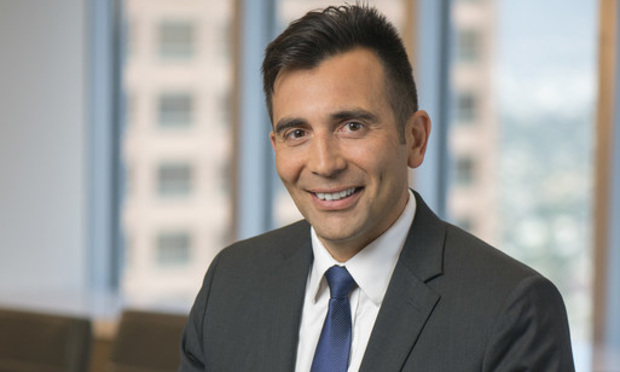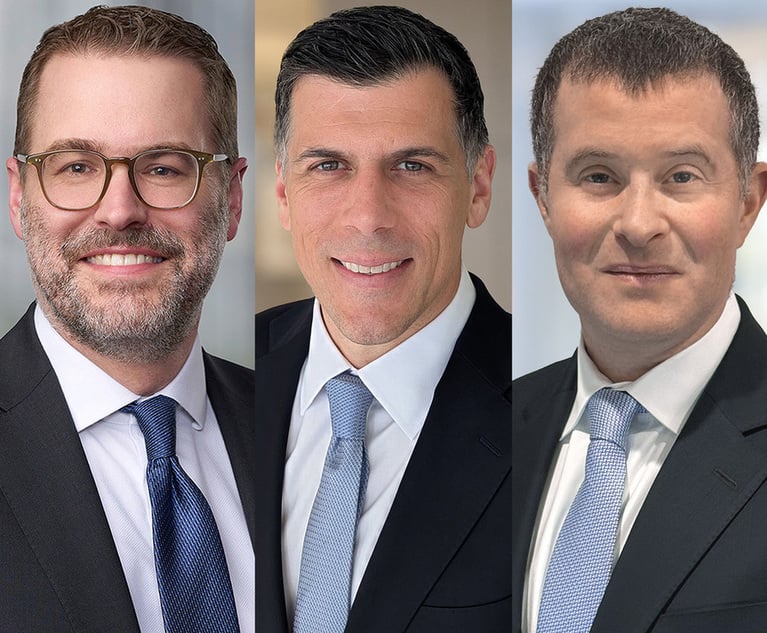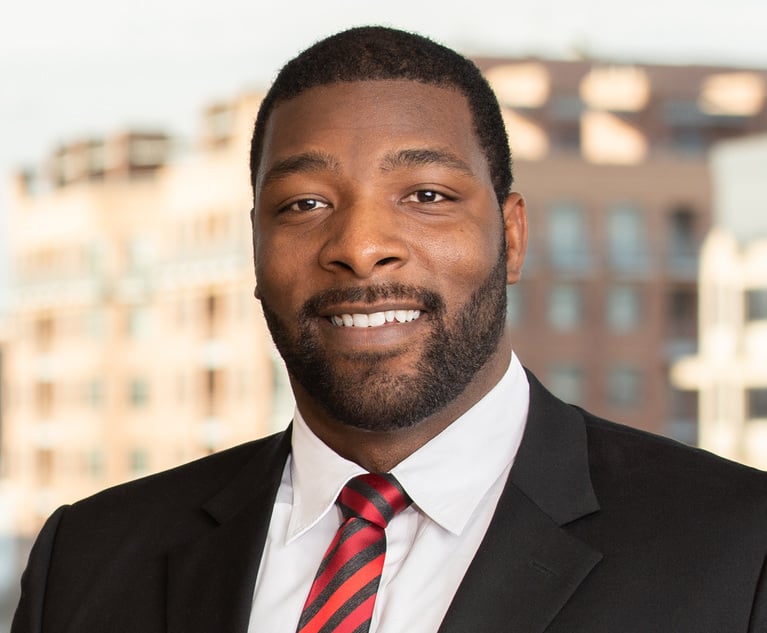Munger, Tolles & Olson
Helping people overcome disadvantages through the law not only fulfills a moral duty, it is deeply rewarding.
April 30, 2019 at 11:59 PM
4 minute read
 E. Martin Estrada, with Munger, Tolles & Olson.
E. Martin Estrada, with Munger, Tolles & Olson.
Describe your firm's philosophy on pro bono service.
Service to the community through pro bono work is one of Munger, Tolles & Olson's core values. Our firm dedicates more than 3 percent of all attorney time to pro bono work each year on cases covering a wide spectrum. In addition, the firm's partner-funded MTO Foundation contributes significantly to providers of legal services to underserved communities.
Of the big cases your firm recently worked on, one included a landmark trial victory in New Mexico. Tell us more about that case and how you reached the outcome.
As co-counsel to MALDEF and New Mexico Center on Law and Poverty, Munger Tolles won a landmark trial demonstrating that the state of New Mexico's inadequate education system deprives children of the educational opportunities needed for college, career and civic life, thereby denying them due process and equal protection. During the two-month trial, educational experts testified about the needs of New Mexico students and systemic deficiencies undermining student success; school superintendents testified that their districts lack resources, quality programs and state support; and families testified about the lack of educational opportunity in the state's schools. The state's experts and officials were forced to concede that, while students at high-poverty schools have less access to effective teachers, the state has failed to provide adequate resources to improve teacher training, compensation, recruitment and retention.
What was the most satisfying aspect of that key case?
We pride ourselves on handling the most complex cases in the country and offering assistance to those most in need. This case was the perfect marriage of those two aims. Routinely ranked at the bottom in terms of academic performance and graduation rates, New Mexico is a state desperately in need of educational reform. While much work remains to be done, this case will have a profound impact on the future of New Mexico, and thus, our country.
Discuss other key pro bono matters recently completed by the firm.
As co-counsel to the ACLU, Munger Tolles obtained a classwide preliminary injunction barring the city of Los Angeles from enforcing "gang injunctions," which the city uses to prevent individuals the city has decided are gang members from participating in various ordinary, legal activities. As co-counsel to the Native American Disability Law Center, Munger Tolles obtained a landmark federal court ruling that schools run by the Bureau of Indian Education (BIE) are obligated to address the mental health and wellness needs of all students. As co-counsel to Public Counsel, Munger Tolles obtained a settlement calling for the county of Los Angeles to implement new policies to prevent inmates with mental illnesses from being released without arrangements for managing their mental health.
Why does your pro bono work matter to you as a lawyer?
As professionals and officers of the court, we owe a duty to contribute to the public good. While there are many lawyers in the profession, too many individuals in need lack access to the legal system and access to justice. Helping people overcome disadvantages through the law not only fulfills a moral duty, it is deeply rewarding. Whether through impact litigation or representing an individual client, this type of work can fundamentally change people's lives for the better.
Responses submitted by E. Martin Estrada, a litigator at Munger, Tolles & Olson, and lead trial counsel on the New Mexico educational rights case.
This content has been archived. It is available through our partners, LexisNexis® and Bloomberg Law.
To view this content, please continue to their sites.
Not a Lexis Subscriber?
Subscribe Now
Not a Bloomberg Law Subscriber?
Subscribe Now
NOT FOR REPRINT
© 2025 ALM Global, LLC, All Rights Reserved. Request academic re-use from www.copyright.com. All other uses, submit a request to [email protected]. For more information visit Asset & Logo Licensing.
You Might Like
View All
Wilmer, White & Case, Crowell Among the Latest to Add DC Lateral Partners
4 minute read
Lawyers Across Political Spectrum Launch Public Interest Team to Litigate Against Antisemitism
4 minute read

Government Contracting Clients Look to Firms to Stay on Top of Trump Policy Changes
4 minute readTrending Stories
- 1States Accuse Trump of Thwarting Court's Funding Restoration Order
- 2Microsoft Becomes Latest Tech Company to Face Claims of Stealing Marketing Commissions From Influencers
- 3Coral Gables Attorney Busted for Stalking Lawyer
- 4Trump's DOJ Delays Releasing Jan. 6 FBI Agents List Under Consent Order
- 5Securities Report Says That 2024 Settlements Passed a Total of $5.2B
Who Got The Work
J. Brugh Lower of Gibbons has entered an appearance for industrial equipment supplier Devco Corporation in a pending trademark infringement lawsuit. The suit, accusing the defendant of selling knock-off Graco products, was filed Dec. 18 in New Jersey District Court by Rivkin Radler on behalf of Graco Inc. and Graco Minnesota. The case, assigned to U.S. District Judge Zahid N. Quraishi, is 3:24-cv-11294, Graco Inc. et al v. Devco Corporation.
Who Got The Work
Rebecca Maller-Stein and Kent A. Yalowitz of Arnold & Porter Kaye Scholer have entered their appearances for Hanaco Venture Capital and its executives, Lior Prosor and David Frankel, in a pending securities lawsuit. The action, filed on Dec. 24 in New York Southern District Court by Zell, Aron & Co. on behalf of Goldeneye Advisors, accuses the defendants of negligently and fraudulently managing the plaintiff's $1 million investment. The case, assigned to U.S. District Judge Vernon S. Broderick, is 1:24-cv-09918, Goldeneye Advisors, LLC v. Hanaco Venture Capital, Ltd. et al.
Who Got The Work
Attorneys from A&O Shearman has stepped in as defense counsel for Toronto-Dominion Bank and other defendants in a pending securities class action. The suit, filed Dec. 11 in New York Southern District Court by Bleichmar Fonti & Auld, accuses the defendants of concealing the bank's 'pervasive' deficiencies in regards to its compliance with the Bank Secrecy Act and the quality of its anti-money laundering controls. The case, assigned to U.S. District Judge Arun Subramanian, is 1:24-cv-09445, Gonzalez v. The Toronto-Dominion Bank et al.
Who Got The Work
Crown Castle International, a Pennsylvania company providing shared communications infrastructure, has turned to Luke D. Wolf of Gordon Rees Scully Mansukhani to fend off a pending breach-of-contract lawsuit. The court action, filed Nov. 25 in Michigan Eastern District Court by Hooper Hathaway PC on behalf of The Town Residences LLC, accuses Crown Castle of failing to transfer approximately $30,000 in utility payments from T-Mobile in breach of a roof-top lease and assignment agreement. The case, assigned to U.S. District Judge Susan K. Declercq, is 2:24-cv-13131, The Town Residences LLC v. T-Mobile US, Inc. et al.
Who Got The Work
Wilfred P. Coronato and Daniel M. Schwartz of McCarter & English have stepped in as defense counsel to Electrolux Home Products Inc. in a pending product liability lawsuit. The court action, filed Nov. 26 in New York Eastern District Court by Poulos Lopiccolo PC and Nagel Rice LLP on behalf of David Stern, alleges that the defendant's refrigerators’ drawers and shelving repeatedly break and fall apart within months after purchase. The case, assigned to U.S. District Judge Joan M. Azrack, is 2:24-cv-08204, Stern v. Electrolux Home Products, Inc.
Featured Firms
Law Offices of Gary Martin Hays & Associates, P.C.
(470) 294-1674
Law Offices of Mark E. Salomone
(857) 444-6468
Smith & Hassler
(713) 739-1250








